JANUARY - Various Countries - Human Rights, Wei Jingsheng
Radical activists collect signatures in parliaments and universities, and via the Internet, to support Wei Jingsheng's candidacy for the 1997 Nobel Peace Prize. China’s most well-known dissident, Wei Jingsheng is presently serving 15 years in prison for favouring democracy in China.

Wei Jingsheng (1998)
16/17 JANUARY - France: Strasbourg - Tibet
At the close of the 2nd European Seminar for the Freedom of Tibet, Tibetan communities in Europe, European Tibet Support Groups, the Tibet Intergroup at the EP and the Radical Party convened the second European demonstration for the freedom of Tibet and for the opening of Sino-Tibetan negotiations, on 9 and 10 March in Geneva.
About 70 people from Slovenia, Albania, Kosovo, Hungary, Czech Republic, Russia, Ukraine, Romania, Belgium and Italy, took part in the Seminar.
30 JANUARY - Italy: Rome - Antiprohibitionism
The Constitutional Court declares inadmissible most of the Referendums presented by the Movimento dei Club Pannella and others, including the one on drugs, justifying this verdict with a reference to Italy’s obligations under international Conventions.

31 JANUARY - Norway: Oslo - Human Rights, Wei Jingsheng
RP Secretary Olivier Dupuis presents to the Nobel Peace Prize Committee in Oslo the signatures of 1,084 parliamentarians, university professors, former Nobel laureates and men of government, all proposing that Chinese dissident Wei Jingsheng be awarded the 1997 Peace Prize. Wei Jingsheng is serving a 15-year sentence in the Tangshan concentration camp, where his health is giving serious cause for concern. "Wei Jingsheng is a symbol, a symbol of resistance, of the struggle for freedom and democracy. A symbol for hundreds of millions of Chinese. A symbol for millions of people in Turkestan, Mongolia and Tibet who continue to resist the unrelenting colonization and fierce oppression of the "red" mandarins in Beijing", affirmed Dupuis.
20 FEBRUARY - EP: Strasbourg - China, Death Penalty
In view of the meeting of the 53rd UN Commission on Human Rights in Geneva, the EP approves a document asking the EU to make China one of the Commission’s priorities, following the large increase in human rights violations there.
All Member States are also requested "to support during the 1997 Session of the UN Commission on Human Rights a resolution for the adoption of a moratorium on executions as the first step towards the abolition of the death penalty for any and all crimes".
11/21 FEBRUARY - UN: New York, International Criminal Court (ICC)
A Radical delegation (Marino Busdachin, Paola Costantino, Marco Perduca, Mauro Sabatano) is permitted to participate in the work of the PrepCom for the ICC. The PrepCom has been mandated to elaborate a "consolidated" text, by evaluating various alternatives to the statute drawn up by the International Law Commission as well as eventual amendments or notes concerning said text, in view of the Conference of Plenipotentiaries to be held in Italy, in 1998, for the establishment of the International Criminal Court.
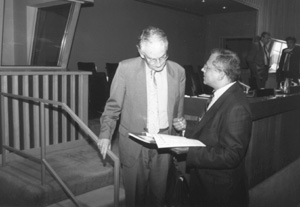
New York, U.S.A. The UN.
Marino Busdachin (right) talking to Adriaan Bos, Chairman of the PrepCom
25 FEBRUARY - Italy: Mantua - Tibet
Paolo Pietrosanti of the Radical General Council speaks at a meeting of the "Parlamento della Padania", an organ created by the secessionist Lega Nord (Northern League) in Italy. At the end of the proceedings the "Parlamento" unanimously approves an agenda proposed by the president, Speroni, committing the Lega Nord to do everything in its power to make the Geneva demonstration and the "Una bandiera per il Tibet" (A Flag for Tibet) initiative a success.
3 MARCH - Russia: Dzerzhinsk - Antimilitarism
An assembly held by the RP and the ARA in the region of Nizhny Novgorod is interrupted by a group of nationalists hurling insults like "Deserters, criminals, enemies of the Motherland!" at Radical antimilitarists. The participants turned the other cheek, moved to another room, and a local antimilitarist group had been set up by the end of the assembly.
3 / 4 MARCH - Hong Kong - Human Rights, China
A delegation of MEPs (Bertel Haarder, EP Vice President and Liberal; Olivier Dupuis, Reformist; Gary Titley, Labour; Graham Watson, Liberal) meet the highest representatives of the British territory that will be returned to China on 1 July. The MEPs make a strong recommendation to the European Union.
9 / 10 MARCH - Switzerland: Geneva - Freedom for Tibet
On 9 March over 3,000 people from several European cities (Lyon, Marseilles, Grenoble, Bordeaux, Florence, Milan) and from Switzerland itself, took part in the second European demonstration for the freedom of occupied Tibet, gathering outside the gates of the UN building to ask for the opening of Sino-Tibetan negotiations. Many personalities and representatives of the promoting groups made speeches. In his speech RP Secretary Dupuis suggested that everyone unite to organize a world Satyagraha in 1998.
In the evening a colourful torchlight procession was held along the lake-shore, and on the following day - the anniversary of the revolt in occupied Lhasa - a protest meeting was held during which a message from the Dalai Lama was read to participants.
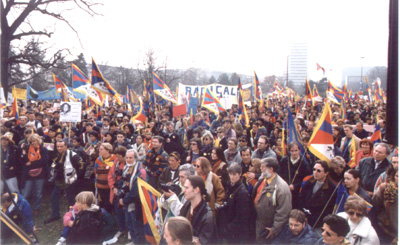
Thousands of letters and faxes have been sent out during the first three months of the "Una bandiera per il Tibet 1997" campaign, which now has the official support of 560 mayors from over 20 countries, who have promised to fly the Tibetan flag from their town halls on the anniversary of the Lhasa uprising. Some city councils have also dedicated a square or street "to the freedom of Tibet". Demonstrations will also be held in many other cities.
11 MARCH - EP: Strasbourg, 97 - Antiprohibitionism
On the initiative of the CoRA, Radical MEPs Gianfranco Dell’Alba and Olivier Dupuis present and succeed in having adopted an amendment to the EP report on the Schengen Agreement. In the amendment, the Strasbourg Assembly deplores the fact that the French Government maintains Customs posts along the Franco-Belgian border to impose a more restrictive drugs policy on the Netherlands.
14 MARCH - EP: Strasbourg - Tibet
The European Parliament adopts a Resolution for the opening of talks, without preconditions, between China and Tibet, and advocates full autonomy being granted to Tibet on all issues.
The initiative undertaken by the Alleanza Radicale, EPP, Liberals and Greens was crucial in quashing the obstructionism and opposition from the Socialist group led by Colajanni and Colon y Nava.
22 MARCH - European Union - Antiprohibitionism
The CoRA presents a petition at the European Parliament, asking that drug abusers be guaranteed the right to circulate freely in all EC countries. This right risks being seriously compromised by the various drug policies and state intervention in the treatment of drug addiction. With this petition, the CoRA aims to pursue at the European level one of the objectives established by the Congress of Brussels, i.e., "antiprohibitionism on cures".
23 MARCH - Italy: Rome - Antiprohibitionism
Marco Pannella, leader of the RP and of the Movimento Club Pannella in Italy, is sent for trial for instigation to commit a crime and to the consumption of hashish, as well as for pushing drugs, after having presented a packet containing a few grams of hashish to the female host of an Italian TV talk show while they were on the air. Pannella has to stand trial on two other charges linked to similar antiprohibitionist actions of civil disobedience that he carried out last year with Paolo Vigevano, Rita Bernardini, Mimmo Pinto, Benedetto Della Vedova and Vittorio Pezzuto, who have also been charged.
10 MARCH / 18 APRIL - UN: Geneva - Human Rights
A large RP delegation, comprising several Italian high officials, participates in the work of the 53rd Commission on Human Rights, and many members take the floor.
27 MARCH - UN: Geneva - Human Rights, China
Wei Shanshan (sister of imprisoned Chinese dissident Wei Jingsheng) speaks on behalf of the RP at the Commission on Human Rights, explaining why her brother and other political prisoners in China have been imprisoned for simply expressing their views, and describing the harsh prison conditions they are forced to endure. Wei Shanshan concludes with an urgent appeal that "national security" in China and other countries be further investigated, with a view to obtaining the immediate release of all those serving prison sentences for the abuse of the "laws" governing national security.
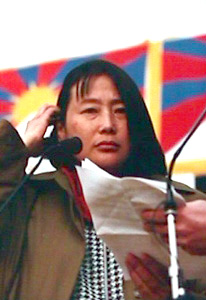
27 MARCH - UN: Vienna - Antiprohibitionism
During the work of the "Drugs Commission", the transnational Radical Party takes the floor and asks, in view of the failure of the repressive drugs policy implemented in the world to date, that the UN give individual States the possibility of trying out alternative policies and, more particularly, of evaluating the practical application of the antiprohibitionist option.
MARCH - France: Paris - Antiprohibitionism
During the "International Conference on Harm Reduction" CoRA Secretary Eric Picard presents a petition at the European Parliament asking that the doctors’ freedom of treatment, the drug abusers’ right to cures, the prescription of substitute medicines and the controlled administration of heroin, be guaranteed throughout the European Community.
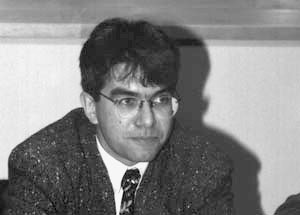
Eric Picard
Historical references:
March-April, Albania. Economic and political crisis provoked by financial scandals, with armed revolt in a number of regions and mass exodus of refugees. The OSCE approves the deployment of a military contingent - led by Italy - to ensure the distribution of humanitarian aid and, eventually, new elections. Government of national unity led by Bashkim Fino.
2 APRIL - UN: Geneva - Human Rights, Turkestan
Erkin Alptekin, a member of the Radical delegation participating in the work of the Human Rights Commission in Geneva, takes the floor to remind those present that the treatment of ethnic minorities by a State cannot be considered merely a domestic issue. China's treatment of the Uigur in East Turkestan, involving the repression and killing of thousands of people, the systematic destruction of their cultural and religious identity, and mass population transfers, has also been inflicted on Tibetans and other peoples, and it is the International Community’s duty to intervene.
2 APRIL - UN: Geneva - Human Rights, China
The RP presents a fully-documented report denouncing the detention of 1018 political prisoners in China, as of December of 1996. They are mostly Mongols, many of whom are under eighteen and all of whom were incarcerated for supporting the Tibetan cause or religion. The prisoners are all serving sentences of more than one year, and the report also lists many cases of torture.
The transnational Radical Party points out that violations are increasing exponentially, and concludes by calling on the Commission to adopt a severe resolution on China. This resolution is not passed, however, due to French opposition and Italian ambivalence.
3 APRIL - UN: Geneva - Death Penalty
With 27 votes for, 11 against and 14 abstentions, the UN Commission on Human Rights adopts, for the first time, a resolution engaging Member States to move towards a moratorium on executions.
Led by Italy and France and supported by 45 countries, the abolitionist front did not give way to pressure exerted by the U.S., China and Islamic countries, all strongly opposed to the document. The majority of African States, India and Cuba abstained, revealing that they are slowly but surely progressing towards an abolitionist position.
The initiative, promoted by Hands off Cain and the Radical Party, was zealously undertaken by Italy and France.
The passage of the resolution is the first unmistakable sign that the retentionist front at the UN is weakening, notwithstanding the narrow abolitionist defeat last December.
7 APRIL - Ukraine: Kiev - Death Penalty
A large-scale initiative is undertaken to support and publicize the abolition of the death penalty in Ukraine. Demonstrations outside the Parliament, press conferences and speeches by personalities and experts, result in endless abolitionist articles being published and influential figures speaking in favour of abolition on the television and radio. The fact that the Ukraine Parliament will discuss in April a bill providing for the complete abolition of the death penalty is partly due to the above mobilization.
Olga Cechurova, member of the Radical delegation, takes the floor to point out that AIDS sufferers are still being discriminated against in many parts of the world. She also calls on world governments and the Office of the High Commissioner for Human Rights to guarantee respect for human rights within the context of the AIDS pandemic, giving particular attention to the weaker and less informed segments of the various populations.
9 APRIL - Italy: Pisa - Human Rights, China
During the official visit of the President of the Chinese Parliament, Qiao Shi, dozens of Radical activists demonstrate for the freedom of occupied Tibet and for democracy in China, but are stopped by the police who confiscate the material and arrest some of the protesters.
10 APRIL - EP: Strasbourg - Human Rights, China/East Turkestan
On the initiative of the ARE Radical group and of Karl Habsburg Lothringen of the EPP, the European Parliament approves, for the first time, a resolution on East Turkestan, condemning Chinese policy aimed at eliminating the Uigur people (through mass population transfers, birth control, religious oppression, indiscriminate application of the death penalty and other gross violations of human rights). The resolution asks for a dialogue to be established between the parties and insists that the Chinese authorities allow journalists and human rights observers to enter East Turkestan.
10 APRIL - UN: Geneva - Human Rights, China
The Presidency of the Italian Senate decides to further delay the discussion at the UN Commission on Human Rights of the joint EU Resolution on the violation of human rights in China and Tibet. This decision – like the one announced in January by France which the Radicals countered with an appeal to French deputies – is a way of evading the issue. The two countries are not prepared to take any action because of the strong commercial interests at stake. Spain and Germany adopted a similar position, withdrawing their support.
Faced with French opposition and the ambivalence of her partners, the Netherlands declined to exert its presidential powers.
10 APRIL - EP: Strasbourg - Human Rights, China/Hong Kong
Bearing in mind that Hong Kong will once again come under Chinese rule on 1 July 1997, the EP requests the European Union and its Member States to insist, with one voice, that the principles laid down be respected by the transfer of sovereignty. Among other things, the EP called on the Commission to present an annual report on political, economic and human rights developments in the Region and urged that an EP information mission be sent to Hong Kong following the transfer of sovereignty.
17 APRIL - EP: Strasbourg - Security, Federalism
Two months prior to the Intergovernmental Conference that will deal with the revision of the Treaties, 101 MEPs put forward a proposal for reforming foreign and collective security policies, which envisages equipping the Union with a European military and civilian force to both re-establish peace and carry out peace-keeping operations. Signatories are the ARE (promoters of the initiative), EPP, PES, UPE, ELDR, Greens and Non-attached.
Historical reference:
19 April, Bulgaria. After seven years of Communist rule, Centre-Right parties win the general election. The United Democratic Forces coalition obtains 137 of the 240 seats in parliament. Its programme envisages: economic reform in exchange for loans from the International Monetary Fund; Bulgaria’s joining NATO; the eradication of endemic corruption; the opening of records kept by the secret police during the Communist regime.
22 APRIL - Various Countries - Tibet
The Radical Party launches an appeal to raise money for the "Voice of Tibet" radio station, in dire need of economic support. The station broadcasts a 15-minute daily programme in the "Roof of the World", and is the only voice of freedom and legitimate government in occupied Tibet.
28 / 29 APRIL - Italy: Rome - Tibet, Nonviolence
During the voting on the various agendas concerning the situation in Tibet, thirty or so Radical activists demonstrate in an 18-hour "walk-around" outside the Italian Senate to ensure that the parliamentary debate on the grave state of affairs in the "Roof of the World" does not go unnoticed. However, the final document ignores the repression in Tibet and proposes a general appeal for dialogue between the parties and for cultural and religious autonomy.
Historical references:
1 May, Great Britain. General election. The Labour Party, led by Tony Blair, obtains a landslide victory (after 18 years of Conservative government). Labour’s platform provides for: re-launch of state school system; political autonomy for Wales and Scotland; revision of certain aspects of the Welfare State; reopening of negotiations for peace in Northern Ireland; strengthening of relations between Great Britain and the European Union.
9 May, Netherlands. Four years after its establishment, the Tribunal for crimes committed in the Former Yugoslavia hands down its first sentence, against Bosnian Serb Dusan Tadic. To date, only 8 of the 64 people indicted have been arrested.
13 MAY - EP: Strasbourg - International Language, EP Amendments
MEPs from the Radical group present amendments to the final document on the Green Paper: The Obstacles to Trans-National Mobility, presented by rapporteur Luisa Todini of the "Education-Training-Research" Commission (COM(96)0462 - C4-0580/96). According to the amendments "the European Union cannot provide a valid answer to the question of the circulation of its citizens and of equal opportunities with regard to education, employment and leisure time, until it deals with the issue of language".
"There can be no valid and lasting guarantee of equal opportunities unless Member States of the Union decide to introduce, at their different teaching levels, a "first second" common, neutral language". (...)
"Esperanto not only satisfies the criterion of neutrality, thereby guaranteeing equal opportunities for all citizens of the Union, but also ensures that each language in the Union is preserved to the same degree and learning languages is made easier". (...)
"We therefore call on the Commission to rapidly effect a viability study on the introduction, at all teaching levels in the Member States, of a "first second" common, neutral language".
14 MAY - EP: Strasbourg - Federalism, Security
By adopting the Tindemans report on the "Development of a Common Security Policy" (PESC) with a large majority, the European Parliament has declared itself favourable to a study being conducted on the viability of a military and civilian European corps to restore peace and conduct peace-keeping operations where necessary, following the proposal made by RP Secretary Olivier Dupuis.
Historical reference:
2 June, France. General election. Socialist Lionel Jospin is appointed Prime Minister and forms a government supported by the Greens and by the PCF
12 JUNE - EP: Strasbourg - Human Rights, China
The European Parliament passes a report on "a long-term orientation for Sino-European relations" (McMillan-Scott Report). On the initiative of Olivier Dupuis, RP Secretary and MEP, various amendments are passed on Tibet, Mongolia, East Turkestan, Taiwan and Hong Kong, as well as on the situation concerning human rights in China.
12 JUNE - EP: Strasbourg, 1997 - Death Penalty
The EP adopts, by a large majority, an emergency resolution on the abolition of the death penalty proposed by Olivier Dupuis (ARE), Hadar Cars (ELDR), Adelaide Aglietta (Greens), André Soulier (EPP) and Alexandros Alavanos (GUE), thus confirming its commitment to this issue. Among other things the EP asks the European Union to present at the UN General Assembly a resolution for the institution of a global moratorium on executions.
Historical reference:
15 June, Croatia. Franjo Tudjman is re-elected President.
10 / 20 JUNE - France: Paris - ICC
The first of a series of conferences on the establishment of the International Criminal Court is organized by No Peace Without Justice, an organization federated with the Radical Party, and the Open Society, with the aim of strengthening the campaign for a first segment of international justice, i.e., the ICC. European Commissioner Emma Bonino and Robert Badinter, Presiding Judge of the French Constitutional Court, chaired the proceedings in which numerous political personalities participated, including former UN Secretary General Boutros Boutros Ghali, Cherif Bassiouni, Vice Chairman of the PrepCom for the Statute for the International Criminal Court, French Health Minister Bernard Kouchner, and Adriaan Bos, legal expert and Chairman of the PrepCom for the ICC.
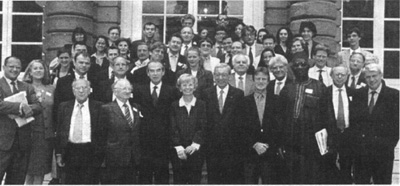
France. Centre, Emma Bonino and Boutros Boutros Ghali.
JUNE - Belgium: Brussels - Antiprohibitionism
While the final passage of a report on drugs is being debated in the Belgian Parliament, CoRA Belgique organizes manifestations outside the headquarters of the Belgian political parties every Monday, to draw the attention of public opinion and parliamentarians to the contradictions in the document under discussion.
The CoRA and the organization Ecolo/Agalev also draw up an alternative report, which is explained at a press conference held by CoRA Secretary Eric Picard, former Liberal Senator Paul Boel, Franz Lozie, deputy and environmentalist, and RP Secretary Dupuis.
JUNE - UN: New York - International Language
The RP organizes an NGO coalition, consisting of the Universala Esperanto Asocio, the World Federalist Movement and the Temple of Understanding, with the aim of introducing Esperanto as the working language of a number of UN Commissions.
1 JULY - Italy: Rome - Death Penalty, Joseph O’Dell
On the initiative of Hands off Cain, celebrities from the world of entertainment and parliamentarians from a wide political spectrum gather together at the Hands off Cain headquarters to send e-mails to the Governor of Virginia, George Allen. The life of Joseph O’Dell, whose execution has been fixed by the Supreme Court of Virginia, is in the Governor’s hands.
Among the celebrities were Vittorio Gassman, Erri De Luca, Giuliano Montaldo, Lina Wertmuller, Elisabetta Rasy, Barbara Alberti, Cinzia Tani and Raffaele La Capria, and parliamentarians included Giovanna Melandri, Marco Pannella, Antonio Guidi, Marco Taradash, Fiorello Coriana, Athos De Luca, Piero Milio, Rino Cirami and Natale D’Amico.
5 JULY - Italy: Rome - Death Penalty, Joseph O’Dell
A sit-in is staged outside the Hotel Excelsior while a delegation of American representatives is on an official visit to Italy. Abolitionists meet various members of the American delegation and deliver to them the appeals launched on O’Dell’s behalf by Italian deputies, and a copy of the resolution for a moratorium on executions passed by the UN Commission on Human Rights.
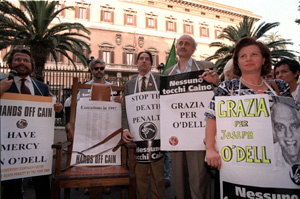
Historical reference:
6 July, Albania. Socialists win the election. Rexhap Mejdani becomes President; Fatos Nano, Prime Minister.
7 JULY - UN: Vienna - Antiprohibitionism
The RP takes the floor at the UN Commission on Drugs during preparations for the General Assembly’s special Session on drugs, convened for 1998.
After verifying the failure of prohibitionism from UN documents revealing that drug trafficking accounts for 8% of the volume of world trade, the RP proposes that the 1998 General Assembly:
confront the problem of prohibitionism on alcohol imposed by various Muslim countries;
categorically exclude from international Conventions the death penalty for any drug-related crime;
review the system used to classify the banned substances, which actually places cannabis and heroin on the same level;
guarantee throughout the world the drug abuser’s right to treatment and the doctor’s freedom to effect the appropriate cure;
carry out a cost-benefit analysis of the policies currently being implemented and open the debate for the revision of the international Conventions on drugs.
Historical reference:
8 July, NATO. At the Madrid Summit, a decision is made to welcome Hungary, the Czech Republic and Poland as members.
8 JULY - Italy: Rome - Death Penalty, Joseph O’Dell
The mobilization to save Joseph O’Dell continues. The Italian Senate also sends messages, via the Internet, asking Virginia Governor George Allen to pardon the condemned prisoner, after the President of the Senate, Nicola Mancino grants Hands Off Cain’s request that a computer be installed for this very purpose. Senator Athos De Luca persuades 50 fellow senators to participate in the initiative.
JULY - Italy: Arezzo - Tibet, Panchen Lama
During "Arezzo Wave", a festival featuring new trends in music, the Radical Party sets up a stand to distribute material and information regarding the campaigns for freedom in Tibet. Hundreds of postcards asking for the release of the Panchen Lama are distributed during the festival.
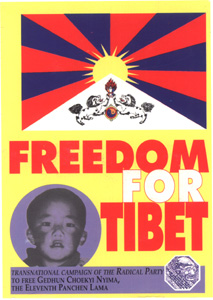
(The postcard designed by the TRP for the release of the Panchen Lama who, aged seven, is the youngest political prisoner in the world. The Panchen Lama was kidnapped by the Beijing authorities in 1996 and his whereabouts are still not known. To date, 11,731 postcards have been sent, from 51 countries, to Chinese President Zemin.
Historical reference:
15 July, Federal Republic of Yugoslavia. Presidentional elections. Slobodan Milosevic is re-elected.
17 JULY - EP: Strasbourg - Death Penalty, Joseph O’Dell
On the initiative of the ARE, EPP, Green, GUE, PES, and UPE Groups, the European Parliament adopts by a wide majority an emergency resolution on the O’Dell case, launching "a solemn appeal to the Governor of the State of Virginia and the relevant American authorities, to at least commute O’Dell’s sentence".
22/23 JULY - Italy: Rome - Death Penalty, Joseph O’Dell
A demonstration outside the American Embassy and an all-night vigil are held on the eve of Joseph O’Dell’s execution. Irrefutable proof of his innocence and the hundreds of initiatives undertaken throughout the world and in Virginia itself, were not enough to save him.
JULY - UN: New York - Human Rights, East Timor
During a special hearing of the Committee of twenty-four for the decolonization of East Timor, the RP stressed that the freedom of the Maubere people should be achieved through a referendum, under the aegis of the UN. The RP also underlined the need for a UN-EU mission to monitor the human rights situation. The Indonesian delegation interrupted the speaker three times. (After 450 years of Portuguese imperial rule, and the fall of the fascist regime in Portugal in 1975, East Timor was invaded by Indonesian troops and annexed as the 27th province of the Republic of Indonesia. Thus the decolonization process that was being carried out by the former imperial power ended, and a reign of terror and violence began.)
JULY - UN: New York - Human Rights, Environment
Parallel to the Earth Summit at the UN the TRP, together with the Burma UN office, the World View International Foundation and the Open Society, cosponsored a round table on the situation with regard to human rights and the environment. During the meeting, a message from 1991 Nobel Peace Prize winner Aung San Suu Kyi was read and discussions were held on the timber trade, working conditions, refugee camps and drug-trafficking. Speakers included: Dr. Thaung Htun, Burmese opposition representative for UN Affairs, Edith Mirante, Director of Project Maje, Tim Keating, Director of Rainforest Relief, Marco Perduca, RP.
6 / 30 AUGUST - UN: Geneva - Human Rights
49th session of the Sub-Commission on Prevention of Discrimination and Protection of Minorities. The RP presents reports and recommendations concerning numerous points on the agenda.
18 SEPTEMBER - EP: Strasbourg - Human Rights, Mongolia
The European Parliament, on the initiative of the Radical group and with the support of the EPP, Liberal, UPE and Green groups, passes a resolution condemning the serious violations of human rights by the People’s Republic of China in Inner Mongolia, which China has occupied since 1947.
19 SEPTEMBER - Italy: Rome - Antiprohibitionism
The 7th Penal Section of the Rome lawcourts finds Marco Pannella guilty of distributing drugs gratis and sentences him to 4 months imprisonment (commuted to 8 months parole).
At the Porta Portese flea market, in August 1995, Pannella and the leadership of the Movimento dei Club Pannella - Riformatori, distributed several grams of hashish during a demonstration in favour of the referendum for the legalization of soft drugs.

Porta Portese, Rome. August 1995
Pannella has two other sentences pending: the first, for distributing hashish to passers-by in Piazza Navona, Rome, at Christmas time, dressed as Santa Claus (December 1995); the second, for having presented an entire "cake" of hashish, weighing about 200g., to TV presenter Alda D’Eusanio, during a broadcast of "Italia in diretta" (Italy Live) (December 1995).


Pannella distributing hashish, dressed as Santa Claus; D’Eusanio with the hashish Pannella presented to her.
Drugs: Pannella gets himself convicted
29 SEPTEMBER - Italy: Rome - Human Rights, Afghanistan
A demonstration is staged by Radical leaders and activists outside the Afghan Embassy asking that they guarantee the release of Emma Bonino, who was arrested in Kabul by the Taliban while on an official visit as European Commissioner. (Bonino was released after a few hours.)
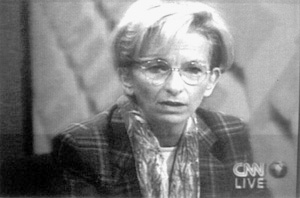
Emma Bonino tells CNN how she was arrested in Kabul
3 OCTOBER - Sweden - Human Rights, Wei Jingsheng
The Nobel Committee awards the 1997 Peace Price to the organizations campaigning for a total ban on the production and use of land mines.
The RP and Human Rights in China announce that they wish to present Wei Jingsheng as a candidate, for the fourth time, together with Wang Dan, leader of the Tiananmen movement, also in order "not to discourage the millions of Chinese, Mongols, Uigurs and Tibetans who are constantly struggling to establish democracy in China".
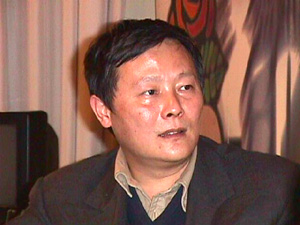

Wei Jingsheng (1998) and Wang Dan (1989)
8 OCTOBER - ITALY: Turin - Human Rights, Wei Jingsheng
A few days prior to the assignment of the 1997 Nobel Peace Price, the Radical Party holds a sit-in outside the venue of the "Chinatown d’Europa" Conference, asking that the Prize be awarded to the leader of the Chinese dissidents, Wej Jingsheng, who has been in prison for 18 years simply for having maintained that China is in need of democracy.
12 OCTOBER - Italy: Rome - Antiprohibitionism
Nine hundred small packets, each containing 1g of hashish, are distributed during a demonstration at Piazza Navona, in which over 1,000 people take part. Those arrested and charged with distributing drugs free of charge include: Rita Bernardini, Lista Pannella, Olivier Dupuis, TRP Secretary, Pier Luigi Camici, Alessandro Caforio, Radio Radicale editor, Mauro Zanella, Cristiana Puglisi and Marco Pannella – who gave a packet of hashish to a police officer.


Rita Bernardini and Olivier Dupuis are arrested at Piazza Navona, Rome
The initiative was aimed at reforming the Decree Law on drugs, 309/90, which equates the consumption of soft drugs with that of heroin and cocaine.
Further demonstrations (nine in all) would be held in the following weeks, so that the issue of the legalization of the so-called soft drugs might be put on the agenda and discussed in parliament.
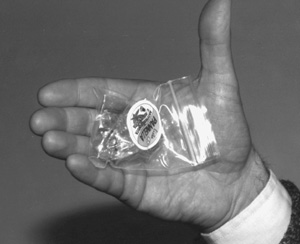
The packets of hashish that were distributed
Historical reference:
19 October, Federated Republic of Montenegro. Reformist Milo Djukanovic, advocate of greater autonomy for Serbia in the Yugoslav Federation, is elected President.
23 OCTOBER - EP: Strasbourg - EP Amendments
Several amendments concerning the EU Budget for 1998 are presented by Radicals Gianfranco Dell’Alba and Olivier Dupuis, and approved. "It was a real battle against the other groups, which often saw us allied with the Christian Democrats but against the Socialists on almost every issue", declared the Radical MEPs.
24 OCTOBER - EP: Strasbourg - Human Rights, Korea (North)
The European Parliament passes an emergency resolution on the famine in Korea (North). More particularly, an amendment presented by the ARE and EPP groups proposing that the UN offer international protection to Korea (North), with a view to holding democratic elections, if serious reforms are not introduced within the next few months, is also approved.
3 NOVEMBER - EP: Brussels - Antiprohibitionism
The Commission of Public Liberties and Internal Affairs approves, by a wide majority, the D’Ancona Report that marks a turning point in EP drugs policy. In her report, Hedy D’Ancona, former Dutch Health Minister and Chairwoman of the Commission, recommends a practical approach that takes into consideration all the positive results of the experiments conducted in various countries, regions and European cities. In particular, the report advocates:
the general application of a harm-reduction policy;
the reform of the international Conventions on Drugs;
the decriminalization of drug consumption;
the legalization of the production and distribution of cannabis.
In less than a year, the D’Ancona Report was to result in a recommendation, signed by at least 61 MEPs, being proposed by the CoRA and PAA (Parliamentarians for Antiprohibitionist Action, the intergroup formed by MEP antiprohibitionists).
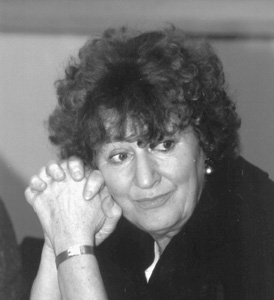
Hedy D’Ancona
15 NOVEMBER - China - Human Rights, Wei Jingsheng
Prominent Chinese political prisoner, Wei Jingsheng, is released and immediately deported. Noting that the expulsion of the "bothersome" dissident was carried out in true Brezhnev style, the RP reiterated the need to continue the struggle for freedom and democracy for the people of China, Tibet, Turkestan and Mongolia, in the name of Wei Jingsheng -- and with Wei Jingsheng.
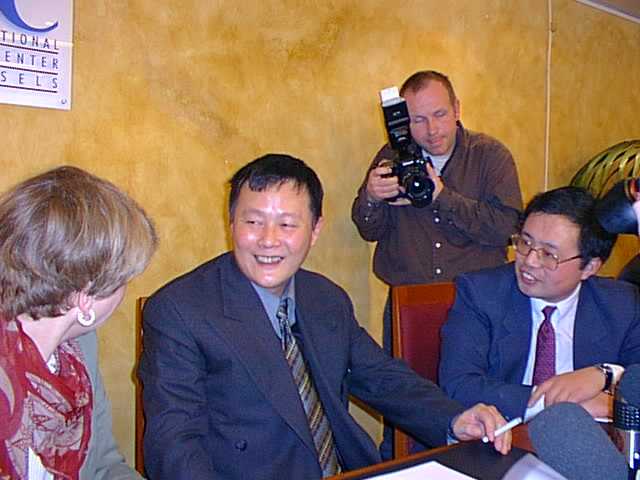
New York, U.S. Wei Jingsheng holds a press conference immediately after his release
The European Parliament adopts an emergency resolution that calls on "the Council and Member States to define a joint position on all the aspects of the Statute of the International Criminal Court and to take concerted action within the PrepCom and at the 52nd General Assembly of the United Nations to ensure that the 1998 Rome Diplomatic Conference will be a complete success, without compromises being made on fundamental questions of principle."
The resolution stresses the fundamental importance of the Court’s being independent of the Security Council and of its being free to investigate real cases and charges on its own initiative without previously having to obtain the consent of the various States. The resolution also engages the EU to ensure that the Statute of the Court permits it to benefit from long-term financing.
2 DECEMBER - U.S.A.: New York - Democracy in China
Radicals Olivier Dupuis, Marino Busdachin and Marco Cappato meet with Wei Jingsheng, the foremost exponent of the democratic movement in China. Wei states that he is ready to relaunch, at the international level, the struggle that he waged for twenty years, both inside and out of the prison camps in the People’s Republic of China.
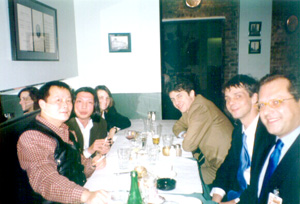
From left to right: Wei Jingsheng, Cappato, Dupuis and Busdachin
11 / 12 DECEMBER - Belgium: Brussels / Luxembourg - Antiprohibitionism
The CoRA establishes two "antiprohibitionist" days to organize new civil disobedience initiatives in favour of the legalization of drugs in Europe and of the enactment of the proposals contained in the EP D’Ancona Report.
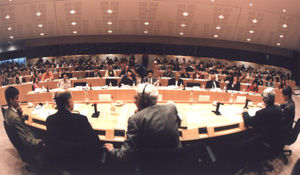
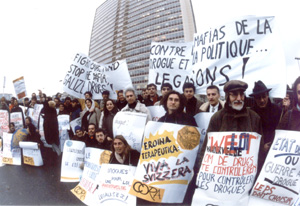
A demonstration is held in Luxembourg while the European Council of Heads of State and Government are engaged in a meeting.
Speakers include Marco Pannella, European Commissioner Emma Bonino, Greek Deputy Foreign Minister George Papandreu, Antonio Almeida Santos, President of the Portuguese Parliament, French Health Minister Bernard Kouchner, Rosie Boycott, British editorialist of The Independent on Sunday, Italian Deputy Justice Minister Franco Corleone.
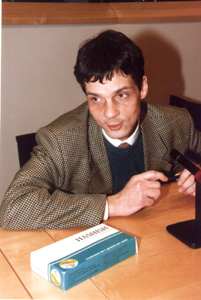
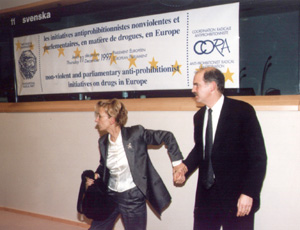
Left, Olivier Dupuis, Secretary of the TRP
Emma Bonino and Greek Deputy Foreign Minister George Papandreu
Historical reference:
16 December, European Union. The European Council decides to start negotiations in 1998 with a view to the accession of six new States: Hungary, Poland, Czech Republic, Estonia, Slovenia, Cyprus.
23 DECEMBER - Italy: Rome - Antiprohibitionism
The CoRA holds a demonstration at Campo dei Fiori to open its 1998 membership campaign. 1,394 candles are lit during the protest, one for each person who died from drugs, or rather is known to have died from drugs, in Italy in 1996, and signatures are collected for bills to legalize cannabis and completely decriminalize the consumption of drugs.